I'm about spent for the day. With no break over Christmas and an official working weekend this weekend things are as busy as normal. Having given seminars at IHEP, the ITP, Tsingua and CCAST over the last few weeks, I'm feeling all talked out. They've all gone OK as far as I can tell and the Tsinghua students seem to have a keen interest in learning more about string theory. I have quite a few more to give when I'm in Japan but these will be on a different topic so I need to get around to sorting those out ASAP.
The threads on Asymptotia and Jaques' Musings sent me searching for information about starting my own research wiki pages. I haven't found anything ideal but pbwiki is about the best free wiki host I've found so far. If anyone can recommend something better then please do tell. If all goes well it should be a great place to keep distant collaborations alive (though msn does a pretty good job of that already). I'm also participating in a string theory reading group with students in the department and have set up a private wiki where we can ask questions and post solutions. While I'm away this should be a good way to keep the momentum going.
So, anyway, I'm all worked out today so I thought I'd try and remember some of the books that I think are worth reading and films worth seeing that I've been indulging in over the last couple of months. Novels have been on hold recently as whenever I haven't been too tired to read I've felt guilty if I haven't had my nose in a text book or paper. I have managed to read a few bits and pieces snuck in with a coffee now and then.
Shortlisted for the Booker Prize a couple of years back, 'The Electric Michelangelo' is an odd mixture for me. On the one hand the story is an interesting tale and the writing is truly stunning in places with imaginative use of language utilising the scenery of pre-war Morcambe Bay and the Coney Island funfair to set a great palette of characters. The problem is that the structure of the book feels awkward. The author is so keen to get the sentence texture just right that standing back from the book the timing jars and the flow is rather stalted by the excellent detail. The characters become a bit bogged down in the detail and you're never really sure what the point is. The main events of the book are built up and occur close to the end of the book making the rest of it lack direction. That said, I enjoyed it and the dark world of the tattoo artist in dingy Morcambe and burlesque New York is still a fun read.
Still in New York 'The Emperor's Children' by Claire Messud is a character study of a group of friends and residents of Manhattan pre and post 9/11. It's a simple book but the story runs easily and there are not only enough interesting characters to build a meaty tale but there's the odd unexpected turn. The book tackles the issue of the mask that we put on in society, and asks at what level anyone really knows us in this multi-layered zoo. Some fun ideas and all worth exploring.
I'm currently reading Lolita, having been told many times by a good friend that I was missing out. Seeing half the Jeremy Irons film version didn't convince me but the book is another world and the writing is truly beautiful, very painful and completely engaging. The subject matter is clearly a difficult one but the character writes with such honesty and acknowledged guilt that you don't hate him as you may expect, you simply feel sorry for him. It's not only the depth of the character study but Nobakov's stunning word-smithery which makes the book flow like little else I've read. I'm only half way through but it's clearly a classic for good reason, not just controversy.
Sadly that's about it for books recently but I've been able to indulge a little more in films. Quite a few of these films come with a health warning, mostly far from family viewing.
Visitor Q fits nicely into this category, though it is about the ultimate disaster in family dynamics. I feel somewhat sheepish to put a link to this movie as the very ideas in the film are pretty repugnant. Miike, who direced Audition - a similarly dark though strangely beautiful film about revenge, plays with just about every taboo imaginable in this film but does so in a way which pushes buttons to make you constantly feel unsettled, not by the subject but the way in which it's portrayed. Anyone who makes it to the end of the film will probably realise that as always in Miike's films there's a lot of very dark humour in with the unsavoury material. In fact it's the less extreme aspects which are the more disturbing, the completely over-the-top ones being just that.
Also from Japan is a much calmer, though far more humanly painful piece from Yasujiro Ozu- Tokyo Story. It's also about a breakdown in a family but this is a passive rather than active breakdown as in the previous film. With tastes attuned to Hollywood action, the slow pace of the movie does age it and there are few shocks to the story given the premise. However, with Ozu's skills the film is beautifully filmed - using the tatami shot for much of the movie - and still engaging. Ozu's films rely heavily on the ideas of "mono no aware", translated as "the awareness of the transience of things, and a gentle sadness at their passing" in wikipedia. For me this Japanese philosophy explains why many of the most moving films I've seen have come from the East. The slow, accepting view of life rather than an active perturbation of it in movies makes the viewer as involved as the director and consequently the director has the ability to move you even more.
Neither slow nor non-perturbative is End of Evangelion. Having mentioned to the friend with whom I set up the 'Beijing book and movie club' last year that I hadn't watched much manga, he immediately gave me a list of must-sees and this was one of the top. It's is a remake of the final episodes of a television series and so, unsurprisingly is rather confusing without the background. It is however breath-takingly imaginative and mind-blowingly surreal and makes CGI effects seem completely redundant. It's strong imagery feels somehow Daliesque (who involved religion in many of his creations) and even without the background and a full comprehension of what's going on, the philosophies (and I don't think it's overstating it to call them genuinely thought provoking ideas) are satisfyingly troublesome. As usual I'm not actually going to tell you anything about what happens in the film but if you aren't annoyed by a lack of concluding explanation and want to see what can be done with animation I thoroughly recommend you to give this a watch. I've never been a terribly big science fiction fan as I see how much time most people seem to put into this genre to get the most out of it. Anyway, even without truly understanding the background of this cartoon it's a hugely creative, powerful watch.
OK, that'll do for now. As I said, this weekend is a working weekend followed by a big night on Sunday and a couple of days holiday. Then off to Korea the following Sunday. The adventures continue.
Wednesday, December 27, 2006
Monday, December 25, 2006
Christmas greetings
Merry Christmas all!
I hope everyone has a great day and a good break before the New Year!
Christmas Eve was spent at Club Tango, dancing to the minimal beats of DJ T with the usual Beijing flare of fire breathers, dancing santas, flaming drinks and enthusiastic crowds. Though a lot of fun with some superb music it's not the same as Christmas Eve in the Chequers in Oxford. I trust that the usual gathering happened and look forward to hearing how everyone is.
Today's a working day as normal but I'm not going to talk work now. I'll shortly be video chatting with my family, thanking them especially for the mince pies and mini-christmas pudding plus many more food goodies which I unwrapped this morning.
Christmas here is a strange affair. Many seem to delight in the decorations, songs and general Christmas cheer. I went to a famous restaurant next to Tango last night and the staff were all dolled-up in Christmas gear. Before going to the restaurant I went for a quiet stroll beside the frozen river. It's not pleasant to be outside at the moment in Beijing as pollution levels are about as bad as I've seen them but the idyll under the trees away from the traffic (20 meters is about as far as you can get from traffic usually here) with the frozen river was a nice moment to reflect and think of home.
----------------
I haven't spoken about books, music or films recently though I have a backlog to discuss. However, yesterday as I sat in my regular coffee spot, a cacophany of computer games and raucus students around me (I use these terms only because I didn't get enough sleep the previous night) my blood pressure rose (the noise plus the strange 50% jump in prices on Christmas eve, plus the network connection which kept timing out) but as I put on Susumu Yokota - Grinning Cat I became sealed in a wonderful, hermetic world where these strange, ambient noises, disharmonies and missing beats are all perfectly measured and I sat back relaxed, instantly calmed in my strange little abstract world. If you like abstract music to work to I suggest giving Susumu Yokota a go. I imagine you can find it on Pandora.com.
Some time soon I'll talk about some of the weird and wonderful films I've been watching, from Visitor Q and Santa Sangre to more Kim Ki Duk and a selection of the finest anime I've viewed, having been told I was missing out by ignoring this genre (I'm swayed on occassion). I'll also talk about a few books I've been reading though novels have been left of late as I've been working rather non-stop.
I also want to talk about the famous Buddha box, which has its origins in Beijing. Sorry, I'm off on a bit of an electronica tangent at the moment but it's keeping me sane, or something approximating that.
Merry Christmas once again!
Posted by
Unknown
at
9:28 am
3
comments
![]()
![]()
Wednesday, December 20, 2006
I return from another session with the postdocs trying to get them performance-ready for the big January show where all Beijing postdocs will entertain each other for an afternoon of song and dance acts. Despite the effort I had remained unconvinced that reciting nonsense poetry was the best option. This decision was confirmed when it was suggested that translating the poem into Chinese may make things easier for the audience to understand.
I came up with an alternative for them in case they really did want to perform something in English and so, a little after lunch today, I found myself standing in front of a dozen theoretical physicists singing Monty Python's the galaxy song. Another of life's strange experiences indeed and, fortunately, not as unpleasant for me as it might have been a few months ago. It was probably unpleasant for them and they agreed that it was probably too complicated to learn in the next couple of weeks and so will find a Chinese number to perform instead. Perhaps a wise choice.
Anyway, apart from that and a very enjoyable evening spent last night chatting with some American's and a Scot in my apartment building over some fine Mexican food and a few beers, work has been almost non-stop. Saturday I was working till late in the evening though again in the pleasant surroundings of a cafe near to Tsinghua. I did get away for a few hours on Sunday to go to Beida (Peking University), and in temperatures well below freezing, spent an enjoyable, relaxed time strolling round the fine century old grounds. Beida, Tsinghua and Nankai university joined and moved down South during the War of Resistance Against Japanese Aggression. According to the museum it has been a center for both cutting edge science and forward thinking since its founding and many key incidents in China's recent history have been linked to the student movements and academic power of the institute.
On the way to the grounds I passed basketball players running around in around -6 in rather surreal settings.
The famous lake at Beida will become an ice-rink soon but for now it makes for a pleasant, quiet setting.
-----------
On a complete change of topic there has been a website I've wanted to write about for a while, having found it through one of the science blogs I regularly read. (I can no longer find who's blog this was, so if you would like the recognition you deserve for finding this interesting site, please send me an e-mail or add a comment)
I've spoken several times about this website with both stunning photographs (like this)and very good explanations of them (Like this description of nacreous clouds or this description of fallstreak holes). (Though I'm quite happy with my status as a physicist in terms of other people's perception of this job - I attempt to show them that I not only enjoy working in the scientific community but enjoy external social interaction too - I do find the name: The cloud appreciation society, a little off-putting.)
As I've mentioned many times before I became rather obsessed with the incredible range of visual effects that light can produce with water droplets, ice particles, dust and air, during my trip to Colorado in 2005. I spent a long time open-mouthed at sights like this:
(Click for a larger version - blogger is allowing up to 8 MB photos on the site now.)
Anyway, to complement the CAS site is the atmospheric optics site which has a similarly stunning range of photos and great explanations to go with them. The bulk of photos on this site are related not to the often chaotic world of cloud effects but to the fantastic, symmetric patterns which, if one is lucky, can be seen produced by light reflecting and refracting from ice crystals suspended in the Earth's atmosphere.
(Photo by Les Cowley who runs the site and kindly let me include his images on the blog.)
Though every snowflake may be different, the hexagonal symmetry of snowflakes and ice crystals is rather stable. Crystals are a good example of the microscopic structure being retained in the macroscopic form (Note that the structure is dependent on the conditions under which the ice formed - there are a dozen or so different phases of ice with different symmetry properties. I seem to remember John Baez wrote a good post about this but I can't find it now. If anyone knows it, please tell me.)
Generally I will only write an explanation of physics or mathematics if I think I can explain it any more clearly than the source in which I've found it. In this case I suggest having a read through the discussion here as to the formation of the most common phenomenon, the 22 degree halo.
Occasionally the conditions are just right so that the whole sky can be illuminated with a complex display of arcs, halos and sun dogs. See this photo for the best display I've found.
Anyway, I'll be looking out for good conditions to get photos of some of these effects, especially over the winter in Korea and Japan. The second half of the Winter school in Korea will be at a ski resort so I hope to return with some good shots.
Posted by
Unknown
at
10:36 am
2
comments
![]()
![]()
Friday, December 15, 2006
In a spin
After a year in China I still haven't worked out which teas will send me to sleep and which will get me buzzing (and some have a much stronger effect on me than coffee). Unfortunately on Wednesday evening during my English lesson I opted for pu-er in the hope that I would rest peacefully ready for the next day's talk at IHEP.
One night but just three hours sleep later I took myself across to the theory group in the institute for high energy physics where Beijing's particle accelerator is stationed. Security was rather higher than I'd expected and gates were cordoned off with policemen all over the place. I was informed that it was for a special international visitor who was coming to give a talk. Sadly they were not talking about me but in fact I had a parallel billing with George Bush Snr. It also transpired that he hadn't bothered to rearrange his talk in order to come and hear about the wonderful world of the AdS/CFT correspondence. Along with a Sino-French conference on the LHC and a talk by Steven Chu I was pleased to have as many people as I did in the audience, though I was told that on a normal day I would have had a few more. With some luck, some skill and fine hospitality on the part of my hosts I managed to get in a quick hit of caffeine before the seminar and the hour and a half talk was a pretty enjoyable one for me at least. Lots of good questions and a generally enthusiastic audience.
Post seminar and large Beijing duck meal, complete with sea cucumber and duck's feet, we went to have a look at one of the control rooms for the accelerator. It's a hive of activity with perhaps ten people milling around and monitoring the 20 or so screens watching the histograms come up and coding up for data analysis and beam control.
When you are running a particle accelerator you don't simply press go, get the particles up to speed and then crash them together. A lot of the time is spent in tuning the machine such that you have good control on the bunches of particles you're accelerating to near the speed of light - getting a smooth profile and getting as many as possible to increase the luminosity of your equipment. The more controlled bunches, the more you can study in a shorter time. This isn't an easy job and the 240m circumference ring is no exception. (Have a read of Joanne's recent detectors masterclass for a good overview of the complementary subject).
The spectrometer attached is primarily built for precision measurements of the J/psi resonance and BES has accumulated the largest number of J/psi events of anywhere in the world.
On top of this is a large proportion of time set aside for studying and using synchrotron radiation for a variety of purposes. Synchrotron radiation is radiation given off when you accelerate a charged particle. Some of the time this happens because your electrons have to go round a corner and some of the time it's because of the wigglers, magnets in your system specifically used to wobble the beam. There are 13 stations around the beam where they use this radiation for medical purposes and/including imaging techniques. A great deal of groundbreaking work has been carried out here in the realms of protein imaging and in areas from archeology to nanotechnology.
Currently BES is being upgraded but the accelerator is still in use so we chatted with one of the scientists on duty. I was interested to see the control room and find out what goes on but I do have a bit of a thing about spending too much time in such places. I spent a week at SLAC a couple of years ago on shift for the Babar detector. The idea is that at all times there must be a couple of people monitoring the huge number of graphs telling you how the detector is functioning and how the data is coming out. If anything goes wrong there are a sequence of strict protocols to go through from flicking a switch, to waking an expert who has to rush in to look at the problem. At some point I will explain why as a theoretical physicist I was performing distinctly experimental duties.
These shifts last for eight hours and I was lucky enough to have shifts ranging from 8pm-4am to those going from 4am-12am (I seem to remember - there may be a four hour slippage somewhere in there). With jet-lag and a schedule of 5 or 6 shifts to complete in a week this is the most confused my body clock has ever been. What is worse than sitting in the control centre monitoring the data is sitting in the control centre when there is no data. Sometimes the beam is lost, literally falling out of the correct trajectory and breaking up and so those in the detector room have nothing to do. At 2 in the morning with nothing to do but a need to stay awake I vaguely remember sending some rather bizarre e-mails that probably appeared drug induced to those on the other end. I also have memories of cycling back to the guest house at four in the morning through the rather eerie undulating Californian roads getting into the realms of the hallucinatory.
Anyway, I'm firmly at the other end of things at the moment sitting precariously in extra dimensions. The weekend beckons...
Posted by
Unknown
at
7:26 am
2
comments
![]()
![]()
Monday, December 11, 2006
Indeterminate states of consciousness
I'm in a cafe on a Sunday evening, slowly working my way through the all you can drink for a pound menu (all soft drinks so as far as I'm aware I'm not poisoning myself as is quite possible here). I've just finished a few hours work, though hours, minutes and days feel much of a muchness to me currently.
It's been a tiring but enjoyable weekend and I'm writing this in the few moments break while working as I'm not expecting much time to breath over the coming week or so.
Friday night started as many Friday nights here do: stuck in traffic in Beijing's non-stop rush-hour (my patience levels for Beijing drivers diminishes by the day). Eventually we made it to the karaoke palace to indulge in the free buffet and meet a swathe of new people.
This was a breakthrough event for me in some ways. I'm regularly surrounded by only Chinese but this was the first time I could take part in any real capacity without using English the majority of the time. This was partly because I was rather a novelty and so I was, on occasion, barraged with questions in Chinese left, right and centre. Some of which I managed to understand and answer with moderate proficiency. This shouldn't be taken out of context, it really was still very basic Chinese but there were moments when I didn't feel completely out of my depth.
The mix of people were from the TV and movie industry, several actors and actresses from one of the national movie channels, program buyers and sellers, a producers daughter (12 years old, to whom, at some unspecified date, I am obliged to chat to in English) and a theoretical physicist. One of the men had spent some time in Russia and when he was told (not by me) that I could speak Russian the mix of languages quickly escalated to completely incomprehensible levels. By the end (after the usual 'how much can the foreigner drink?' tests) Russian conversations were reduced to names of Russian places and 'Ochen harashoa' - very good. I'm not convinced that in the many hours I was there he realised that I understood almost none of what he said.
The actors and actresses were, unsurprisingly rather good on the microphone and this gave me some breathing space in which to save face. I did succumb to a few numbers with the actors doing a fine job of not looking in pain.
Post karaoke we headed to gui lu, ghost street, which has a huge selection of late night restaurants (something which is lacking in most of Beijing - many places are closed by 7 in the winter) and we hotpotted it through till around 3 in the morning.
Saturday day seemed to disappear by the time late lunch had been eaten and an hour doing some work in a cafe had been disturbed with pan-pipe versions of simon and garfunkle and the Righteous Brothers muzaked almost beyond recognition. We had another date with the TV execs, this time at Beijing's battle of the bands. Turning up at Tango club after a dim-sum meal at the superb restaurant next door we stood in a huddle of around 40 supporters for one of the bands, for whom the lead singer is the producer's sister's brother. Most of the bands were the usual, enjoyable, Mando-rock but the particular band we were supporting used a selection of Chinese traditional instruments and singing techniques, modernised into a sound which was actually superb (In a future posting I'll write about some of these instruments and techniques which are often very alien to Western tastes). I have a recording of the event which I will attempt to load up here when I can. Both luck and talent were on our side because they won, meaning that they will be heading to Malaysia for an international event.
Post battle we went to play pool for a few hours before heading to Banana club for a repeat of last year's gig with Carl Cox. Though written in overly-self-conscious tones, my review from last time stands and Beijing remains the city with the most enjoyable clubs I've ever been to. Eleven years on from my first dance floor experience (Josh Wink - Higher State of consciousness at a small club in Western-super-mare) I still get the same buzz when the crowd is euphoric and the base beats are rearranging your internal organs. Such feelings will presumably fade in time but not just yet.
So, getting back at about 4.30 this morning and enjoying a reasonably number of undisturbed hours of sleep I'm back to the present.
Time has done funny things again and it's now tomorrow so I should probably go.
Posted by
Unknown
at
8:18 am
4
comments
![]()
![]()
Friday, December 08, 2006
Not all Nonsense
The talk at IHEP next week has multiplied to talks at Tsinghua and the ITP in quick succession. Should be fun.
In the mean time the weekend promises some rather interesting possibilities, mixing Chinese movie stars and karaoke in one big out-of-tone-glam ensemble.
For now I am bound to link to two stories which have become prominent in the last couple of days.
One of these is from Cosmic Variance, where Joe Polchinski has enlarged on his American Scientist article, answering some of the criticisms Peter Woit and Lee Smolin's books leveled at string theory and the modern theoretical physics community.
This is, unsurprisingly, one of the most level-headed reactions to these books and I look forward to seeing whether the debate can continue with this level of maturity. Unfortunately these threads frequently descend into name calling and the physics is lost somewhere after the first few comments.
Secondly, on a not so impressive note are the claims of a Reading computer scientist to have solved a millenium old problem of dividing by zero. As Clifford Johnson mentions, this sounds like it's straight out of The Onion. Unfortunately this seems to be all too real. The commentators on the BBC site seem to realise, for the most part, that this invention is about as vacuous as the denominator. Mark-Chu-Carrol has written about the best account I've found debunking this bizarre idea. What's most worrying as he says is that there's a class load of kids who not only believe that their teacher is a genius but that the solution he's found to this non-problem is anything other than meaningless.
OK, stars to mingle with, ears to maim.
Posted by
Unknown
at
9:52 am
3
comments
![]()
![]()
Wednesday, December 06, 2006
Poetic Justice
As a China physics blog it seems sensible to provide a link to the New York Times article (linked from The Reference Frame) recently published in relation to particle physics in China, in particular the current accelerator at IHEP, the upgrade which will be taking place relatively soon and the possible scale of Chinese involvement in the ILC. I have a naive suspicion that China, increasing its power in so many ways so quickly, may play a greater role in the ILC than expected. In fact with the current trend to construct objects far greater in magnitude than most other nations would dare (three gorges dam and Beijing-Lhasa train) that I wouldn't be surprised to see it built out here. I'm sure many would not be so amused and the last statement was not said with any inside knowledge!
Anyway, I shall hopefully be able to give more of a first-hand account of the current research happening at Beijing's particle accelerator centre when I go there next Thursday to give a seminar. I look forward to finding out the current climate and will report back with what's news.
In the mean time I've been having once of those rather surreal afternoons. Having been asked to help out with the Beijing postdoctoral New Year's festivities I agreed to do what I could, though I will not be present when they take place.
Those who were reading this 11 months ago will know about my Spring Festival antics (Jan 17th and 18th entries here). I had presumed that my poetic rantings had gone unheard, but, apparently not and the sound of an Englishman reading poetry to a group of 200 Chinese scientists and their families was enough to get some people interested. This afternoon I stood in front of a group of a dozen postdoctoral researchers teaching them to read poetry. The looks on their faces were a reasonable mixture of bemusement and disconnected disinterest. This makes a little more sense when I mention that I was teaching these poor souls to recite Spike Milligan's On The Ning Nang Nong. I chose this (along with the Jabberwocky) to perform last year as I was fully aware that the meaning would probably be lost in the recital and so it was better for their to be no meaning at all. However, now that it's not a native English speaker reciting, things seem all the more surreal.
By the end of the hour I'd got them all bonging, booing, Pinging and Jibber, Jabber, Jooing in time and so, when they come to do this in front of however many hundred other people will be watching in January, an experience will undoubtedly be had by all.
I wish I had more time to write up some reviews of the books and movies that I've been collapsing to recently but that will have to wait.
Posted by
Unknown
at
11:53 am
0
comments
![]()
![]()
Friday, December 01, 2006
Towards the Sun
Somehow Friday has arrived and we seem to have missed out the middle of the week, even though enough has happened for two weeks worth of days. Relativity in action! A few hours yesterday in a cafe at Tsinghua gave me some time to catch up on a couple of papers and I have some possible ideas for a new project.
I've had some good news this week that I'll be going to the Yukawa Institute in Kyoto for a two month visit at the beginning of next year. This will be following a two week winter school on string theory in Korea with what look to be some great speakers.
My last trip to Japan was just two weeks but I had an incredible time out there. The physics was productive and taking in the culture was a joy. I look forward to more of the same.
So, for those who will be coming out to visit next year, I will be a few clicks East until the middle of March. I also will not be coming back for Christmas, as holiday time here is pretty strictly controlled (though my boss has been extremely kind so far in allowing me much more than I should have taken). Still, last Christmas was a peaceful experience and I'm sure something fun will come up this time.
The second piece of good news is that Parcelforce gave in and have reimbursed me for the computer which was badly damaged on the trip from the UK to China. This positive note is only the full stop at the end of a rather ugly saga, but I am pleased that they have done the right thing under the circumstances.
I mentioned a few posts ago when talking about learning Chinese that I've found a superb resource. I have been lent a tape set of 90 half hour Mandarin lessons called Pimsleur Mandarin. They're tedious, really really tedious. The repetition is unending and the pace is slow but if you want to learn the language then they are an invaluable resource. With such an alien language repetition really is the key and I can now be seen walking around with my headphones on uttering random Mandarin phrases as I walk to and from work.
To keep you interested there is a rather salubrious undertone to the lessons. You work up slowly to asking someone if they would like to have a drink or dinner with you but by lesson nine you get a series of crippling rejections by a woman who eventually tells you that you really don't understand, she doesn't want to go out with you at all. Soon you are married, kids have arrived and your wife is borrowing money from you. Around lesson 19 a woman has plied you with beer and you are in her hotel room while her husband is nowhere to be seen, in fact she doesn't know where he is. I'm on lesson 22 on tenterhooks! I'm probably reading too much into this and it's done rather more subtly than I've outlined but the extra touch is a clever one.
Though I complain regularly about the language, it is improving bit by bit. There are however aspects which will forever remain a mystery to me. Though it is in traditional script, meaning that only those in Taiwan will understand it, this ancient Chinese poem is an example of the problems that a highly degenerate language can give you. Enjoy!
Posted by
Unknown
at
12:03 pm
5
comments
![]()
![]()
Wednesday, November 29, 2006
Spaghetti Soup
So, I promised to write about my impressions of the workshop I attended last week at CCAST, the top floor of my building, the ITP.
It was an extremely interesting meeting for many reasons, both from the physics perspective and the sociological perspective.
The workshop was a satellite meeting from the quark matter conference in Shanghai which had happened in the preceding days. It seemed that most people left that conference talking not about the physics but about Larry McLerran's comments on those who were 'shamelessly enthusiastic' about using the AdS/CFT correspondence to study heavy ion physics. In fact I'm not sure I heard much else about the conference in Shanghai. You should really have a look at the file here so as not to take the above comments out of context.
The workshop here in Beijing could be subdivided into three parts. There were two sets of review lectures, one on AdS/CFT in general and one on AdS/CFT with respect to quark-gluon plasma. Then there were lectures by heavy ion physicists using these techniques in their work and finally there were AdS/CFT people who were going into these calculations from the other direction. Oh, and there was me. I had been invited off the back of a talk I gave in Wuhan to give a seminar on AdS/CFT and hadron physics. Slightly off the main subject but it turned out, for me, to be one of the most enjoyable talks I'd given. The difference between this and talks I gave a year or so ago is pretty big. Still a long way to go but at least it feels like progress.
I spoke with many of the physicists there about their past, present and future work and from these conversations and both the lectures and the questions being asked it seemed that this subject is currently extremely dynamic. Physicists coming at the problem from both directions are finding their way and meeting in the middle to come up with some extremely exciting results.
Probably the most exciting results come in those regimes where not only do the lattice results not predict those seen at RHIC but those calculations where one simply can't ask the questions on the lattice. These are questions of dynamics, in particular, transport coefficients.
One of the most interesting talks was by Urs Wiedemann who seems to have been a key player in a lot of the work in this subject (I say this with little knowledge of the subject other than reading some of the recent AdS/CFT - QGP papers before coming to the workshop). I believe it was he who conjectured the non-perturbative definition of the jet-quenching parameter in terms of Wilson lines.
These Wilson line expectation values are pretty easy to calculate in the AdS/CFT correspondence for pure AdS_5xS^5 or the black hole background, or even in more complicated backgrounds. It turns out that the results one gets from these calculations give good agreement with the results at RHIC. What is more is that predictions are continually being made and these will be tested at RHIC and at the LHC.
There are many other interesting results, related to the dependence on the number of colours, the temperature and the wind velocity amongst other things plus evidence that all gravity duals are in the same universality class, giving exactly the same result for the ratio of the shear viscosity to the entropy density. This result again ties in very well with the low viscosity of the quark gluon plasma seen at RHIC.
I would recommend these overviews (1,2) of the subject and these recent papers showing where we're at now.
Calculating the jet quenching parameter from AdS/CFT - Liu et al.
Holography of radiation and jet quenching - Sang-Jin Sin and Ismail Zahed
Strongly coupled quark gluon plasma: The Status Report - Edward Shuryak
Drag force in AdS/CFT - Steve Gubser
Dissipation from a heavy quark moving through N=4 super-Yang-Mills plasma - Friess et al.
(This is another good overview. Anyone who wants to suggest their own or somebody else's pdf or ppt here is free to do so. Backreaction has a recent post though the link to the original post with more detail about AdS/QCD and the QGP doesn't seem to work from where I'm sitting).
At the end of the conference was a banquet where the AdS/CFT quark matter workshop joined the heavy flavour workshop at Tsinghua university. A fine meal and some very enjoyable chat at the table with physicists from around the world. When I was asked what research I did I naively mentioned that my work was related to string theory. This was received with a few chuckles but followed by some quite aggressive remarks and the usual questions about what string theory has done for us and isn't ten years quite enough time for the AdS/CFT correspondence to have been proved. I know that this is probably a daily occurrence for most string theorists but in my somewhat sheltered position here at the ITP, this is the first time I've got into such a discussion where those asking the questions sounded more angry than amused. Speaking with one physicists, a very friendly chap on all other physics subjects, whenever we got near string theory a sneer of derision appeared and another haughty comment as to the facile nature of the quest was made.
This was an eye opener to me to see the other side of what appears to be a fence where before I wasn't even aware that such a fence existed. Naive, I know! It's a rather strange situation where I'm sure that both sides feel like they're talking to proponents of intelligent design (I don't equate string theorists or non string theorists to intelligent design advocates). The other side seemingly won't listen to the debate and the evidence is clearly stacked up with the illusion of perspective. This debate has been had many times on many blogs and though I will not to censor anything (unless it is, in my opinion, in bad taste or overwhelming the overall aim of this blog) I'm not going to try and start something here which seems to have failed many times already. It's clear that whatever the situation, there will be many who are not going to be completely happy until either string theory is ruled out or proved beyond all reasonable doubt. As we gain more and more understanding into the fundamental nature of the universe it seems, unsurprisingly, that such definitive decisions become harder and harder. I've made comments on this previously in relation to The Trouble With Physics.
Still, these few negative exchanges aside I felt that the flow of ideas at the workshop I attended more than made up for those people who believe that a wild goose chase is in progress. It was an extremely enjoyable opportunity for me to learn from those working in a different area to mine and also to be able to provide helpful advice. Several quark matter physicists left the conference with lists of references, jotted diagrams and explanations of equations which I'd happily provided. Such exchanges are part of the joy of the subject I work in and, though I regularly go to talks telling me how high-energy particle physics has been in the doldrums for the last 20 years (though things will soon change), it's wonderful to be in a subject that really is growing, developing and producing results all the time.
Posted by
Unknown
at
6:36 am
6
comments
![]()
![]()
Thursday, November 23, 2006
Rhetorical Answers
As Mathematica chugs along and I attempt to bully it in the right direction I have a few moments to write about another interesting week.
I will talk shortly about some of the comments which have been made recently on Asymptotia, and Backreaction about a certain presentation at the quarks meeting in Shanghai. I attended a satellite conference to this where the talk was discussed with both amusement and frustration. The conference was particularly interesting as many of the people there are heavy ion physicists who have recently moved into AdS/CFT as they really see it as a promising step forward. Shamelessly enthusiastic some would say but I think it's a great sign that there is renewed exchange between these disparate communities. However, I have to leave that to a time where I can think a little more clearly. The end of a tiring week with lots still to do is not the time.
One picture from the conference however is, as usual, gastronomically related. We were taken to one of the best Peking Duck restaurants in town and, unusually, were given a good range of dishes, not toned down for the foreigners. This included the following which is worth trying simply for novelty value.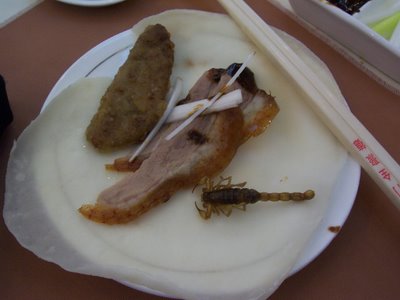
Monday's English corner was as usual full of surprises. Recently I haven't had time to prepare anything in detail, however, because the previous session in which we'd read through, acted out and analysed Ibsen's The Doll's House, had been a success I trawled the web for some more plays to go through. Finding free, short plays online turns out to be a none-too trivial task. After a good deal of searching I found two plays, both of which were abstract enough to keep discussions of the interpretation going for a long time while having language which wasn't going to be a burden. This worked well and we had multiple interpretations of both stories after an hour and a half of playing with them.
I'd struggled to come up with anything terribly inspiring but, as it's an English corner for students who already speak pretty fluently I thought that a discussion on rhetoric would be worth pursuing (both of the plays had included interesting structures of argument which had exemplified tricks of persuasion).
In fact I was also interested to know about rhetoric in China's history and whether there was a similar idea to that of the Greek system of structured argument. Having looked on the web I could find many famous speeches from the Western world but nothing from China so wanted to know whether this was just a language thing. Speaking to the pupils they said that, unsurprisingly, with China's recent history great public speeches of protest were rare and though there had been a few politicians who had persuasive techniques, such a skill was not considered such a great attribute as it was in the Western world.
We moved on to the case of Corax and Tisias and I was impressed to see that several of them had seen this example before. I now realise that getting them to read through a passage in silence in the class disturbs the flow quite considerably so I shall try not to make that mistake again. Still, we discussed this for some time and subsequently started talking about the ancient Chinese philosophers and in particular the language used many centuries ago.
The language in China at that time was filled with even more degeneracy than it is today and a single word, and character could have a vast wealth of meanings. Such sparsity seems initially to be a bad thing, but when used intelligently this means that ancient Chinese writing can conjure an entire story in just a few words. The modern example of this is the four word idiom, which I'm only starting to learn about, but can give a few of examples:
入木三分 means "one with a keen, penetrating intellectual strength" but literally it is translated from "ru mu san fen" as "enter tree three centimetres". This particular example comes from an ancient calligrapher who's forceful brush strokes would penetrate deep into the wood.
囊萤映雪 "nang ying ying xue", (capture firefly reflection snow) - Means to read by the light of bagged fireflies or the reflected light of snow.
望洋兴叹 "wang yang xing tan", (watch ocean breath out) Means to lament one’s smallness before the ocean.
悬梁刺股 "xuan liang ci gu", (suspend beam stab thigh) Tie one’s hair to a beam to keep from nodding off or prod oneself awake with an awl in the thigh.
OK, a few examples but it seems that they are still used in conversation and writing today to express concisely a metaphor for some sentiment or action. I'd be interested to hear from any Chinese speakers about your favourite idioms or correct me on any of the above comments
Lots of photos and comments from the conference I attended this week to come, including the joys of giving a talk which seemed to go successfully. For now my program is calling me so I must get back to work.
Posted by
Unknown
at
10:10 am
4
comments
![]()
![]()
Monday, November 20, 2006
Beijing Resummation
The winds rolled into Beijing a couple of weeks ago making even short excursions outside a treacherous event.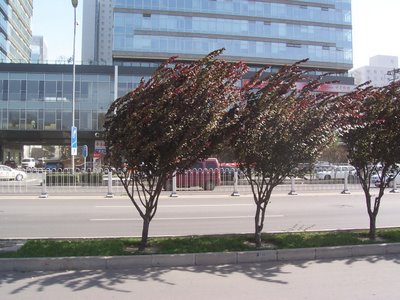
Things have been really busy of late, hence a lack of posts. I finished another paper on Friday which is online today. We've got some interesting results related to AdS/QCD. We've calculated the back-reaction on the pure AdS geometry of a quark bilinear condensate. From this we can perform the usual five-dimensional holographic calculation to get the vector, axial vector and pseudoscalar sector masses and decay constants. The important point about this is that an IR cutoff can be dynamically generated (as you would expect from some sort of brane-distribution in the IR) leaving you with just three free parameters, as in QCD. We get consistent results, of the same order as those without the back-reacted geometry. The check here is that adding this singular behavior to the geometry doesn't mess up all the good results you already get from AdS/QCD. There are additional directions that we want to take this, in particular to investigate linear confinement. In particular the paper was motivated by these two papers (http://arxiv.org/abs/hep-ph/0602229,2).
Anyway, so, that's been taking a little time to finish off. On top of that I gave a one and a half hour talk on Friday to some of the students on 'hadrons from holography' trying to introduce the idea of holography independent from the AdS/CFT correspondence (which is the most concrete example we have of a holographic theory). There's a very good talk by Raphael Bousso here on holography which is probably fully understandable by anyone with a degree in physics and still interesting to anyone with a keen interest in the subject.
Tomorrow there's a conference in my building on AdS/CFT and quark matter where I will be giving a talk on the first day. Most people will be talking about the recent, interesting work on quark-gluon plasma so my research will, I hope, be an interesting diversion. I'm also looking forward to chatting with some of the researchers and finding out the latest developments.
So, along with keeping up Chinese lessons (my two co-flounderers and I attempted to translate a Chinese version of Kurt Vonnegut's A Man Without a Country into English with reasonable if slow success!), English lessons and English corner (for which I still need to plan two hours of activities tonight) life-has been hectic as ever.
On Saturday night I met up with a friend who is about to leave for Singapore to become an air-stewardess. We went to a superb Thai hot-pot restaurant called The Lemon Leaf and spent three hours chatting while dipping all manner of exotic flora and fauna into a tom yum broth. It's expensive but well worth it. After that we headed for a foot massage to let the food digest. It's constantly amusing to see the faces of the masseuse when they see the size of my feet, often never having seen any quite so flipper-like. I had a new treatment this time which involved the use of hammers, little ones with rubber on the end. Though they sound soft, when they're perccusing your legs vigorously the feeling builds up pretty steadily to a fiery ache. I didn't try the scraping treatment however which I was told with a grin leaves you red-raw but free from bad energy, or something. I'm actually a fan of some Chinese medicine (though most of it should be investigated for long-term side-effects) though removing bad moisture with suction cups and bad air with pins and needles is something I've avoided so far.
--------
So, this is the long-promised post attempting to sum up my feelings so far on the ultimate reason that I'm out here; not as one may perhaps imagine the cheap food and fine night-life but my research. So, I'd like to try and identify what it's like to be a post doctoral researcher and, in particular, one in Beijing.
Even with the inherent pressures of getting the next position, advertising myself through giving talks and contacting other researchers, getting interesting papers published and trying to stay on top of the recent results, life as a postdoc is generally a pretty relaxed one when compared with most office jobs. That is not to say that what I do doesn't require a great deal of effort and I don't spend some considerable time stressing over calculations and understanding the latest papers but in terms of being in charge of my own time and efforts, I'd say I'm pretty well off.
I don't have someone watching over my shoulder to see that I turn up at nine on the dot (though I usually do) and there are generally few deadlines. This lack of obvious, listable pressures presents its own problems as, in order to keep yourself motivated when calculations inevitably go awry and you haven't given a talk for a while is not trivial.
Especially out here where one is easily cut-off culturally from the discourse that one may have in a native English speaking department an extra effort has to be made. One year in and I'm fully aware that my lack of Chinese is an added burden to interacting fully with the group. There's currently an American Professor in Chengdu who is absolutely fluent in Chinese after three years here though I'm told that he doesn't spend much time with the laowai and immerses himself in Chinese culture and language. Clearly the way to go but this is a step into the dark which I've been hesitant in taking. Doing this and research seems a tough juggling act.
The structure of the department is a little different from that which I've experienced in the West, though not vastly. My boss has four postdocs and around 10 PhD students which unsurprisingly makes him a busy man. As he will also be head of the KITPC when it opens for real his juggling act between heavy burdens of administration and research must be very difficult indeed, but he does seem to manage. This group of 15 or so has a diverse range of interests from perturbative and non-perturbative QCD through cosmology, supersymmetric model building and more. The group gets together fairly regularly for one of the students or postdocs to give a talk, as I did last Friday. They're casual affairs which usually culminate in getting a food delivery. It seems that this way of organising the group has made for a good, relaxed atmosphere for the students to learn and research in.
A normal day is a little difficult to pin down but the general pattern goes something like this:
I tend to get up around 8.30 when the diggers and angle-grinders outside my window make sleeping impossible (they often start at 6 but I can now cope for a couple of hours with them disturbing my rest). I stroll towards the office about nine o'clock from the accommodation campus (with its 5000 or so students) through to the ITP site, about five minutes walk. On the way I usually pick up a snack from the stand serving students with a plethora of fried treats and cups of milk.
It's often this walk between my flat and the office which sets the mood for the day, whether or not I get charged down by a speedy cyclist or whether the lights turn in my favour as I get to the road, whether I get cut in front of at the food stall or whether the sky is a particularly glorious blue. The shuffle function on my ipod can also set me bouncing, or not, though currently I'm listening to some superb Chinese lessons which a friend has sent to me. I will talk about them some time as they're the best material I've yet come across for learning the language (this isn't Chinese Pod which is also a great resource).
The trees are coming to the end of their autumnal transformations, many of them now a vibrant yellow, having turned deep red briefly last week. If you can get here and walk up xiang shan (fragrant hills) when the red maple leaves are out, it's well worth it but timing is both crucial and very difficult.
Getting into the office I check the notice boards for interesting talks coming up, though most of the time the notices are all in Chinese. I head up to my third floor office which I share with another postdoc sit down and spend half an hour checking e-mails, the news, my site feeds (updated blogs) and the arxiv for recent additions, both good and bad, to the sum total of our knowledge of the universe. I may spend some time reading through any interesting papers which have come on that day.
The rest of the day is a bit of a slippery beast and working out the most efficient way to plan it can depend on many factors.
Currently I'm working on three different projects, all of which deserve significant proportions of my time and so I try and juggle that sensibly. Some of the time will be spent performing calculations, with pencil and paper or on the computer. Some of it will be spent writing up my thoughts and some will be spent talking with my collaborators about our project. As I mentioned before I'm working with a Japanese researcher in Japan and a German researcher in Poland and we often spend several hours on msn battling through our brain-waves or arguing over interpretations. Sometimes I will simply go and sit in the library working through a problem or browsing books for ideas.
Reading papers and books is my main source of input at the moment because, as I've mentioned before, most of the seminars are in Chinese. This is something that I would tell people to take into account as a huge factor if you're thinking of coming to a country where English is not a language which is spoken extensively. Because people unsurprisingly also chat about physics in Chinese, this makes talking with other researchers difficult. This isn't because they're unfriendly, they clearly have a great time from the animated conversations and frequent laughter I hear rattling down the corridors but I've failed myself in integrating with this set. I think I would probably recommend more than anything else spending a couple of months before you start research in a place like this to learn the language as intensively as possible. There are many good schools where you can spend 6 hours a day in class. You won't be fluent but you will pick up enough such that learning more becomes a lot easier. If you don't do this I suspect you will constantly be stuck at the first hurdle. Please get in contact with me if you are thinking of coming out here and I can find out the best schools to attend.
So, depending on the day of the week, my time in the office will end at around six or I will stay here till ten or eleven at night. Currently because work has been so busy I've been working at the weekends too which explains the lack of exciting extra-curricular activities to talk about. Usually I spend some of that time working in a nearby cafe, reading through a text book or a paper and taking things a little more easily. This is in no way as stressful as it may sound as relaxing with a coffee and a paper is an enjoyable activity. I'm not however somebody who can do this all the time so I do take time off to watch movies and read books (more reviews coming up shortly)
Rather unusually I have just learned that I will have to write a thesis at the end of my time here. Without this I will not receive a certificate. I hope that a concatenation of my papers with sensible editing will be enough for this. I've learned today that in China the reason for getting this certificate is that without it you can only become an assistant professor and not an associate professor.
So, that's a rough idea of the day-to-day life of an English postdoc in Beijing. On top of this I have the next stage to think about and am currently behind on my applications for next years position. As life goes on for a researcher, the burden of teaching, grant applications and supervision clearly supersede the rather casual, if busy lifestyle I've outlined here but, as people are certainly not in it for the money, there must still be a fair share of highlights to life as a researcher further down the line.
Posted by
Unknown
at
8:55 am
2
comments
![]()
![]()
Tuesday, November 14, 2006
Parcelfarce
I'm in the process of writing a lengthy post attempting to sum up what it's like to be a postdoc in Beijing. This sounds like a fairly niche market but if my advice is useful to anybody coming out here or thinking about going for a postdoc then I'd be happy.
Anyway, I'm afraid this has to be a rather more negative post than that one will be. The saga which started here, related to my computer continues.
In summary, having sent my laptop from England to China via Parcelforce, it was severely damaged in the post. Parcelforce know this because they've been given a detailed description and photos. I moaned in the original post I wrote about this that Parcelforce say it may take up to 60 days to sort this out. Well, day 84 and I haven't heard anything from them. My father, the sender of the parcel, has attempted to contact them on numerous occasions only to be met with completely ludicrous brick walls. First they said that they needed me to give them details about the state of the package when it left the UK. As the receiver of damaged goods it's pretty hard for me to say what state it was in when it left, but I have the senders word that it was in perfect order prior to its journey here.
Secondly Parcelforce said that they would need to send me a letter for me to answer their questions. When it was put to them that perhaps an e-mail would be quicker, the woman in charge said that she would not be able to send an e-mail without the permission of her boss. In the 21st century, sending an e-mail still seems to give some people problems.
So, we've now made genuine threats to send letters to the appropriate high up places to get them moving and the deadline we gave them (today) has now passed.
The reason I'm writing this post is simply to warn people that if you're going to send anything valuable long distances, DO NOT USE PARCELFORCE. If you do and you are unlucky enough for something to go wrong with the parcel in transit, the likelihood of sorting out the situation in a reasonable time seems small.
So ends the rant.
Posted by
Unknown
at
10:38 am
4
comments
![]()
![]()
Monday, November 13, 2006
Getting Two Thumbs Up?
And another seven people know the depths to which my singing abilities can plummet. This was the culmination of a stereotypically strange but enjoyable evening.
A couple of weeks back I'd been asked to help out with the career development society of the Chinese Academy of Sciences as a native English speaker. Because many of the students will head into industry or beyond in multinational companies, it is important for them to have good experience with professional interviews. I said that though I had no experience with such interviews I was very happy to take part. Somebody else from a large company would be there interviewing with me so I wasn't too worried about my lack of experience. I was simply there as a native speaker. The first strange aspect of all this was that the rest of the career development society would be there as an audience.
I was sent the resumes of the students I'd be interviewing and had a quick look through to get some ideas of sensible questions. I was also sent a list of oft asked interview teasers. The time came around last night and I headed over to the room, only to discover that I was the lone interviewer and the professional was a no-show. I met this with mixed emotions including a mild feeling of panic but figured that I could still make this a respectable experience (speaking of which I was dressed up in my finest suit). A had expected that the other person would be leading the interview and I would simply interject when appropriate so this left me with 15 minutes to read through the resumes again and come up with something sensible. 20 minutes later having introduced myself to the audience of 20 or so I gave the first half hour interview to a student of polymer sciences, hoping to take his academic knowledge into the real world. Five seconds before I started I hadn't clearly decided what I was going to say but having composed a reasonable first question as I spoke, the rest of the interview went smoothly and was a lot of fun. I neither made my interviewee cry, nor do he have a free ride and people seemed genuinely pleased with the outcome. After each interview I gave my feedback which I expressly pointed out would simply be my 'common sense' and was in no way a professional opinion. Still, they all seemed to nod sagely as I spoke and came afterwards to give very pleasing feedback on the whole experience. Apart from the fact that the room was truly freezing and I couldn't feel my feet by the end I would definitely be happy to help out at this sort of event again.
So, in celebration of this event (having interviewed four students over a two hour period) karaoke was the order of the night. Some student qualities being universal, the fact that karaoke becomes very cheap after midnight made this the sensible time to head there. As the guest I seemed to sing considerably more than my fair share. After a shaky start and a shaky middle my singing continued on to a shaky if enjoyable end. From the three times I've been to karaoke so far there have been a reasonably large selection of Western songs to choose from. Unfortunately my knowledge of NSync, the Backstreet Boys and Boyzone isn't up to the challenge, so I spent my time mutilating Beatles classics and a few other more embarrassing numbers.
Around three in the morning my eyes lit up as I spotted one particular song on the display and, though I think the others perhaps didn't share my enjoyment, my highlight of the evening was giving a rendition of Bad Touch by the Bloodhound gang. A truly memorable experience.
Along with a great deal of rather surreal dancing, some good free food and some fine singing from the others, it was another unexpectedly enjoyable evening. Having got back at around four in the morning, I've spent today struggling to keep my eyes open while finishing off a paper which must now be checked over by the other authors, and writing a couple of talks which I'll be giving over the next week and a bit.
There was a photographer in residence to take photos of the interviews which I shall post when I get hold of them. Fortunately the karaoke was neither recorded in audio or photographic format. This, I promise is a good thing for the rest of the human race.
Posted by
Unknown
at
10:27 am
0
comments
![]()
![]()
Wednesday, November 08, 2006
One Year On (Part 3)
I realise each time I finish a review posting that it's virtually impossible to sum up these subjects satisfactorily in a few paragraphs. I would like to add many afterthoughts to the last two postings but simply don't have time at the moment.
As an aside to today's postings I should mention something that currently fills me with some guilt. The heating in Beijing has not been turned on yet and, if last year's winter is anything to go by, the heating in the flat is simply not enough to keep my extremities much above freezing. I spent most of last year in gloves and scarf. So, with a bit of persuasion from those at home and abroad I bought an electric heater for the flat to make things more comfortable. In a nation choking itself with such atrocious pollution from the coal-burning power-stations (currently one built every week), adding another load to the system is not something I feel good about. Unfortunately because we don't have the power to control our own flat temperatures, I feel forced to do this. The fact that I currently take public transport almost all the time now makes up for this a little but I'm still left with a heavy conscience.
OK, I don't have much time today to write anything so will simply sum up a few of my favourite views from the last year. I guess I must have taken four or five thousand photos since I arrived but these are a few that sum up some of the stunning and sometimes bewildering things I've seen. Again, these miss out many important and astounding things that I've seen and done in the past year but, searching through my photo folders these are the ones that jump out most. They will be in no particular order as sorting that out will take too long for now (Mathematica is fighting back today).
The weather here may be the next posting and the storm clouds that frequented the city through the summer kept me mesmerised for hours. These ones glaring at my flat through a couple of nearby skyscrapers bought some fine fireworks with them, though I've still not managed to catch a lightning strike on film.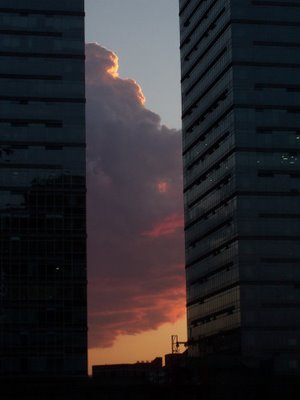
Sunrise in the plane flying from Munich to Beijing gave a satisfying abstract.
The summer palace as we headed into winter last year.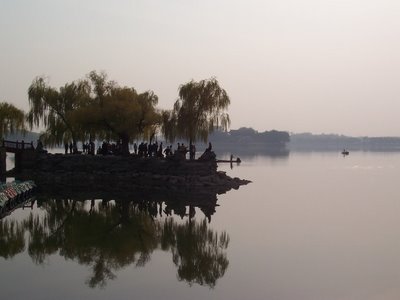
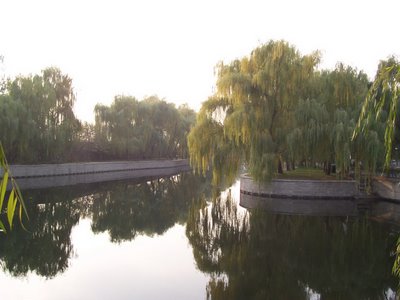
Fiery leaves in Tongli.
Happy driver in Souzhou.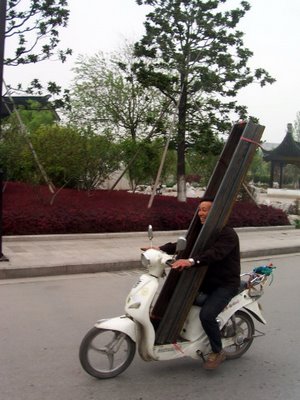
Slow life on the Yangzi river.
Picnic with English Corner students.
Happy kids in my neighbourhood.
Mount Fuji in all its stunning glory.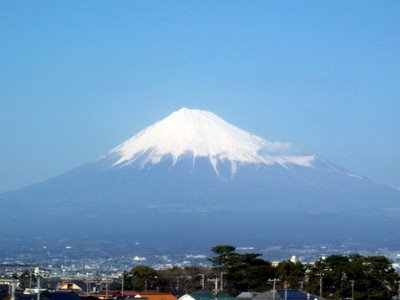
Pondering in the Forbidden City.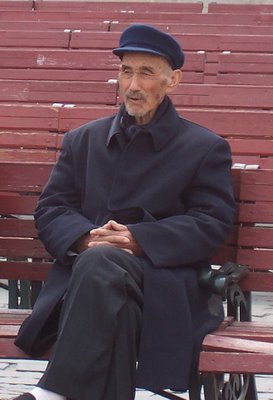
Back home in England for a few minutes of relaxation playing frisbee with friends.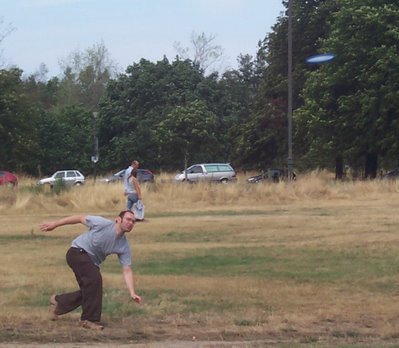
Ex-houses in Xi'an.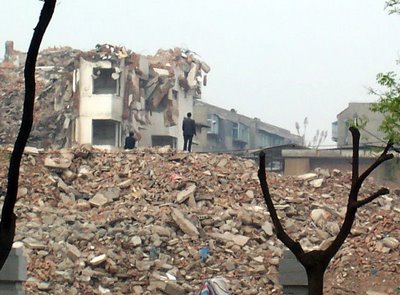
Happy families in Tongli.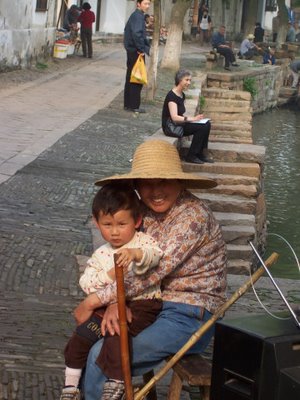
Reflections from the Golden Palace in Kyoto.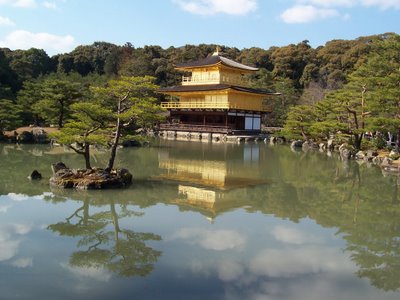
Dancing man tree in Souzhou.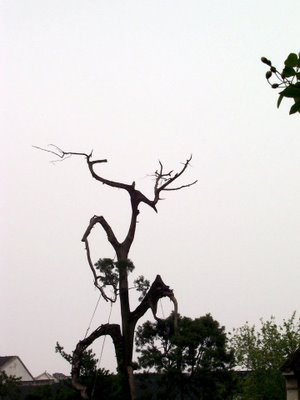
Hangzhou reflections.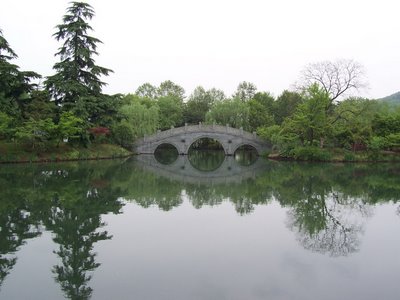
British summer wildlife.
Boatman on the Yangtzi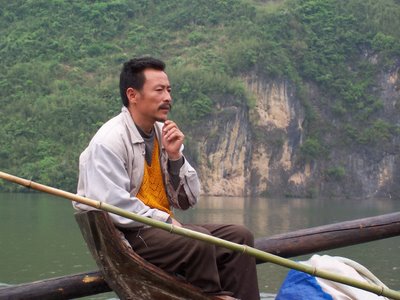
Bamboo view in Souzhou.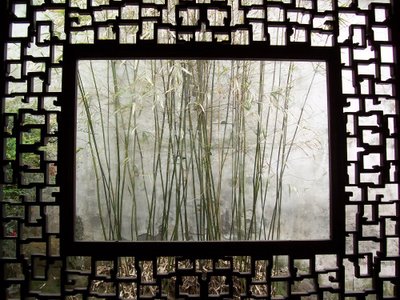
Monks in Xi'an.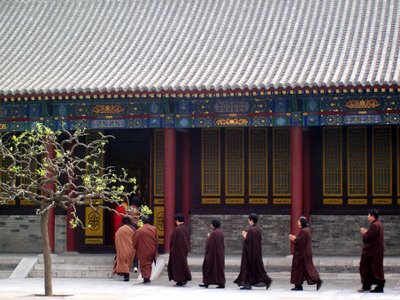
Ant-cleaners on a local office block.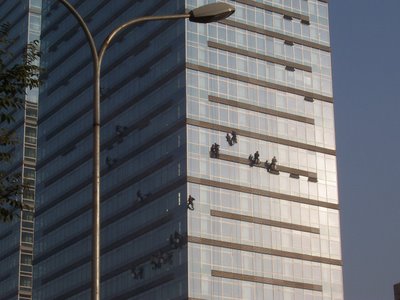
Beijing Punk.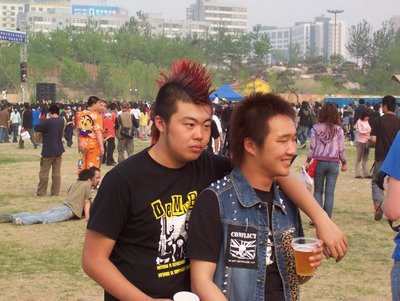
Duck tongue delicacies.
Beautiful clouds from my balcony.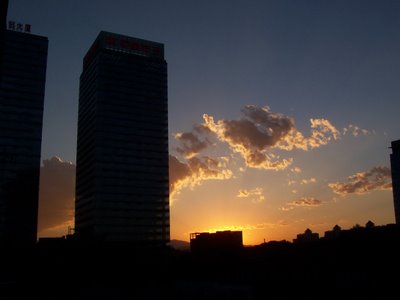
From this list I can already think of many things I've missed out but this gives a cursory idea of what's been going on. Still to come I want to talk about research over the last year as well as the bizarre weather patterns, the music, cinema and literature scene and a few others. I feel that it's injustice enough to try and sum up these topics so 'the people' is certainly not a subject that I will attempt to dilute into a single posting. Coding battles to return to.
Posted by
Unknown
at
8:24 am
2
comments
![]()
![]()
Tuesday, November 07, 2006
One Year On (Part 2)
The second installment for the year's review will be on another subject which dominates my time here. That is language, both Chinese and English.
Chinese continues to be bewildering, frustrating and, at times, enjoyable with more and more flashes of recognition all the time. As of recently I'm having lessons with two other Westerners which is making the two hours a lot more enjoyable. Previously I had found that after a 10 hour day in the office, the prospect of two hours of Chinese lessons, mimicking tones and constructing sentences from words which are individually meaningless, was not something to be savored. However, with three of us, the pressure is off and I get more time to think about what I'm learning. Unfortunately I just don't have the time to practice in between the lessons in a structured manner, though I do talk to some of my friends in Chinese now (perhaps 10% of what I say is in Chinese when talking with some people). I estimate that I now recognise two hundred or so characters and 500 spoken words. This is not a great deal though it is at least some progress.
I now get together to practice on a Sunday afternoon in a cafe with my two classmates and this extra, relaxed sessions is very helpful. Having two other learners (both of whom are substantially better than I am) to drive me on is a real boon.
I should probably start to add the odd Chinese character here and there to the blog, as most expats seem to do when they're learning the language. It would probably be good practice for me, but as this blog is predominantly for friends and family, few of whom speak Chinese, I shall attempt to alienate as few as possible.
A short, technical aside. Up until now I've been learning the speaking and writing together, learning to write a character when I use it in a dialogue from my book. This approach has missed some basic structure on the written side, which I would advise everybody whose learning Chinese, to study first. On the writing side, before getting onto building your character database, I would really advise getting a book which goes through the hundred or so most common radicals.
The basics of the Chinese written system is an interesting topic even if you don't want to learn the language. Of the 50,000 or so Chinese characters, many of them developed from pictograms. Over the last couple of thousand years they've gone through major changes, generally ending up in a form which looks nothing like the original object. The last change was a move to a simplified written system, which did make the characters easier to write, though often removed any similarity the character still had to the original picture. Modern Chinese characters are often made of two parts. One is called the radical and gives some clue about the rough subject of the character, the other part is often phonetic, giving a clue about how to say the character. This means that even if you've never seen a character before, you can often have a rough idea of the meaning and a guess at how to say it. For example, the following character is the character mama meaning mother: 妈妈. Each ma, 妈, is made of two parts. The part on the left means woman and is found in many characters: 好, hao (a combination of mother and child), meaning good, for instance. The second part of the character in 妈 is the phonetic part, which means horse and is pronounced ma (though with a different tone from the word for mother). The phonetic part itself is found in many words: 吗,ma, indicating a question, for instance (again, a different tone from both mother and horse). Other examples of radicals indicate that a word is related to movement, speaking, hearing, strength, shellfish, people, water, fire, etc. etc. and learning these to start with should make your life a lot easier. This is all really basic stuff to most Chinese learners. What I'm saying here is either for those who are about to start learning Chinese or simply for those who are interested in knowing a little about the structure of the written system.
I've only just started to learn the radicals in a structured manner, rather than just learning them as I come to a word with one in. Having started now, I've almost doubled my comprehension of the characters I see around me in just a couple of weeks. I can't pronounce what I see as my knowledge of the phonetics is not great but understanding and spotting patterns is part of what I do for a living and so is the most natural way for me to learn this bizarre language.
Often when I talk with a Chinese person about learning the language they ask me what I am learning it for. This doesn't mean that they don't think I should be but, sensibly, that one should have a goal for such a task. If I want fluency then I'm clearly not going about it the right way and, without a doubt, my research would suffer if I did aim for that. It's sad to say but I can't see myself continuing to study Chinese in any great capacity when I leave the country. The likelihood of me ending up in a non-English speaking country next is pretty high and so another language will probably take over as top priority. It would be a real joy if my Chinese was good enough to have a conversation with a stranger about topics other than where I'm from, what I do, the price of oranges and the weather. I have a year to go and by the end I hope to reach this point, especially with the added impetus from my new classmates.
I can't pretend not to think that the character system is simply inefficient though I have learned to understand the power of a large degeneracy in character meaning. Though I haven't read any Chinese poetry I have now heard some (most Chinese students it seems put in a great deal of effort to learn the classic poems and everyone seems to have not only read the classic texts but enjoyed them and continues to return to them). I've got glimpses of the power of the language from this as a short line with perhaps four or five characters can express a vast wealth of feelings and imagery that English doesn't seem to be able to do so simply. A deep knowledge of the characters would clearly make Chinese poetry a fascinating area and it is with regret that life just doesn't seem free enough to take on that challenge right now.
--------------
I continue to teach English to a private student once a week and in addition to substantial payment, I get taken to restaurants which I would never be able to afford on the Chinese salary I earn. In fact this student is already pretty good though, as is often the case, confidence is the main area which is lacking. I hope that fluent conversation in a relaxed atmosphere will be enough to make a difference.
English corner continues and is an extremely enjoyable activity for two hours on a Monday evening. Last week we had a dozen students turn up and spent the session reading through, acting and analysing Ibsen's 'The Doll's house'. Though reading is still one of my passions and I enjoy writing short criticisms of the books I read out here, I haven't sat down and really analysed a play, or short story since I was about 14, and I remember it being a real bore then. However two hours talking through the final scene from Ibsen's play was an enlightening experience and every insightful comment provided by the student added another facet to the story. It was agreed at the end of the session that we should do something similar again which I very much look forward to. Up until now we've played a lot of word games in the class and that has proved an interesting exercise for me to see what aspects of language are easy and hard for people who've grown up learning a character system.
As I mentioned previously, one of the most enjoyable days was a short trip with the English Corner group to Tsinghua University where we sat by one of the beautiful lakes, eating a picnic and chatting.
--------------
One of the biggest problems with the language is still the fact that I don't get to follow very many seminars here in the department, so it is easy to get out of the flow of any research which isn't directly related to my work. I've given up sitting through lectures for the most part as I could spend my time far more constructively reading a book on the subject rather than struggling to pick out the odd word which may mean something to me. As the first Westerner in the department of course I can't expect them to change the way they do things just for me, so I must simply try and make up for the lack of direct input via other sources.
OK, enough, more tomorrow if I have time.
Posted by
Unknown
at
5:47 am
1 comments
![]()
![]()
Monday, November 06, 2006
A Year On (part 1)
Typing is far from easy at the moment as I currently have little to no feeling in my fingers. Eating with chopsticks is also a non-trivial task! I don't want this anniversary posting to be a negative one but it's a simple truth that I don't like being cold. The weather has turned from high 20s to a wind-chilled, howling gale in just a few days. It was a strange, sudden change as the Siberian front hit and immediately the outside world was thrown into chaos, as people leaned into the wind to stop from teetering over backwards and outdoor markets were turned upside down. It's still a couple of weeks until they turn the heating on and in the meantime my flat is virtually uninhabitable. I shall be spending the maximum possible time defrosting in the sauna in my gym.
Anyway, enough of the negative. It's been a year, half my time here, since I left England (after a slight false start) and strolled blindly into this adventure. It's been a great experience so far in many many ways and I figured now was the time to sum up a bit of what's been going on.
I just haven't had the time to blog as frequently as I was before, mostly due to work being very active at the moment. Currently most of the time that I'm not working I'm teaching English or having Chinese lessons. Socialising has sadly taken a bit of a back seat and I hope to be able to do something about that over the next few weeks.
I wrote a long post over the weekend about some of the things which have been going on recently which I still need to go through, so I thought that I would give daily installments with some of the highlights of life out here.
As it was one of the first things that I got excited about out here and something that still pleases me constantly, the delights of Chinese food seem like a good place to start so today I shall be enthusing about all things culinary from dou zhi to ku gua and everything in between.
I haven't really spoken about the summer food much but there's a lot to get excited about. The roads are littered for several months of the year with trucks and stalls selling a cornucopia of amazing fruit. The honey-sweet grapefruits the size of your head, the fantastic watermelons and the pomegranates from Chengdu without the bitter pith of those we get in the UK, are all daily treats. All around the city you see giant persimmons growing on the trees and they come straight to you with all their leady goodness for a small price.
The range of flavours of vegetables is also astounding with the bitter melon a favourite Hunan delicacy and from Yunnan the stinky fish grass proving to be one of the most unusual flavours but rather fine when your taste buds get over the initial shock. When you go into a supermarket the fruit and vegetable stalls are overwhelming with a carpet of amazing colours to match the smells which assault you as your walking around (the durian fruit with its smell of old socks being the prime example). The spectrum of fungi alone is incredible with perhaps 20 or 30 different shapes and colours available through most of the year.
...and onto the main course which was what I loved to talk about when I first got here and reveled in the exotica on the menu. The highlight was probably pig's brain which melts in the mouth and tastes subtly nutty, though you should be careful as porcine encephalitis is not uncommon. The giant snails in a spicy Szechuan dish which you eat wearing plastic gloves are also sumptuous. The Chongqing hotpot is a minefield of unusual flavours and textures with tripe and intestine being one of my favourite additions. Along with a lot of chili in this dish there is always a good handful of the infamous Szechuan pepper which numbs the mouth and, in combination with the chili, leaves you tingling for hours. Another dish dominated with the chili is the oil-boiled fish which, give or take the bones, is a stunning combination of simple, powerful flavours.
Some of the other unusual dishes which I won't be ordering again in a hurry are sea cucumber (a little like slimy bunsen burner tubing, though probably with less flavour), donkey, and camel's hoof (makes me think of eating a woolen tea-coaster soaked in gravy). Surprisingly beef lung isn't that bad and the ever popular chicken's feet and chili-oil duck's neck now make a regular appearance most times I sit down to watch a movie.
Eating from the street-vendors stalls is a bit hit and miss and I've had a couple of bad experiences with dodgy food disagreeing violently with me. That said, the pancakes and dumplings are usually a good bet. Down in Wangfujing the tourist haunt for the weird and wonderful left me thinking that silk-worm grubs are kind of cheesy while scorpion and star-fish are more crunch than taste. I wouldn't be surprised if such delicacies were on lists of endangered species so a) I won't be trying them again and b) I wouldn't recommend them simply because the novelty value is really all there is to offer.
I'm still to make my way through the true, old Beijing food but my one recent foray, trying dou zhi, fermented mung bean juice reminded me of stilton with fermented cabbage. Apparently this should not be sipped walking through the hutongs but drunk slowly over some fine pickled vegetables. I'm game if I find another vendor at an appropriate time.
I remain unconvinced that Beijing duck is much better here than elsewhere but I suppose while you're here at least it's cheap.
I still have a long list of things to try though a few dishes which I will definitely not be trying have been added to the list, most of which contain some combination of household pets. As an omnivore I recognise that this is a strange line to draw but I'd rather eat pig any day over dog or cat. Yunnan and Guandong cuisines seem to offer the highest number of the weird and wonderful so I shall try and get down South when I can. This quest to try different dishes isn't just some attempt at proving my gastronomic worth but is a genuine journey in sampling new and interesting flavours and textures. I became convinced within just a few days here that the constraints of good and bad food we have placed on our palates in the West are detrimental to the enjoyment that we can get out of a full spectrum of ingredients. I shall certainly try and look out for many of these things when I'm back home, and convince as many as possible that they're really missing out without them.
OK, lunch-break is over. Calculations to continue with so I shall call it a day for now. Questions on the above topics are welcome if any seem appropriate. I shall continue tomorrow on another aspect of the last year if time allows.
Posted by
Unknown
at
5:38 am
3
comments
![]()
![]()
